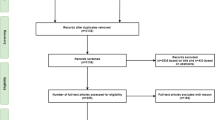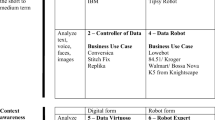Abstract
Over the years, AI has undergone a transformation from its original aim of producing an ‘intelligent’ machine to that of producing pragmatic solutions of problems of the market place. In doing so, AI has made a significant contribution to the debate on whether the computer is an instrument or an interlocutor. This paper discusses issues of problem solving and creativity underlying this transformation, and attempts to clarify the distinction between theresolutive intelligence andproblematic intelligence. It points out that the advance of ‘intelligent’ technology, with its failure to make a clear distinction betweenresolutive andcreative intelligence, could contribute to the further cultural marginalisation of human activities not connected with production. A further danger is that AI products may suffer a further loss of social reputation and prestige for those activities for which it is not possible to build artificial devices.
Similar content being viewed by others
Bibliography
Buchanan, B.G. (1985), ‘Expert systems: working systems and the research literature’,Expert Systems, 3, Nol.
Coombs, M.J. (ed.) (1984),Development in Expert systems, Academic Press, London.
Dreyfus, H.L. & S.E. Dreyfus (1986a), ‘From Socrates to expert systems: the limits of calculative rationality’, (eds.) Mitcham, C. & A. Huning,Philosophy and Technology 11, D. Reidel Publishing Company.
Dreyfus, H.L. & S.E. Dreyfus, (1986b),Towards a reconciliation of phenomenology and AI, (mimeographed).
Fodor, J.A. (1983),The Modularity of Man, MIT Press, Cambridge, Mass.
McCarthy, J. (1983), ‘Some expert systems need commonsense’,Annals of the New York Academy of Science.
Negrotti, M. (1984), ‘Cultural dynamics in the diffusion of informatics’,Futures: The Journal of Forecasting and Planning, 16, No1.
Author information
Authors and Affiliations
Rights and permissions
About this article
Cite this article
Negrotti, M. The piping of thought and the need for a permanent monitoring of the cultural effects of artificial intelligence. AI & Soc 1, 85–91 (1987). https://doi.org/10.1007/BF01891269
Issue Date:
DOI: https://doi.org/10.1007/BF01891269




